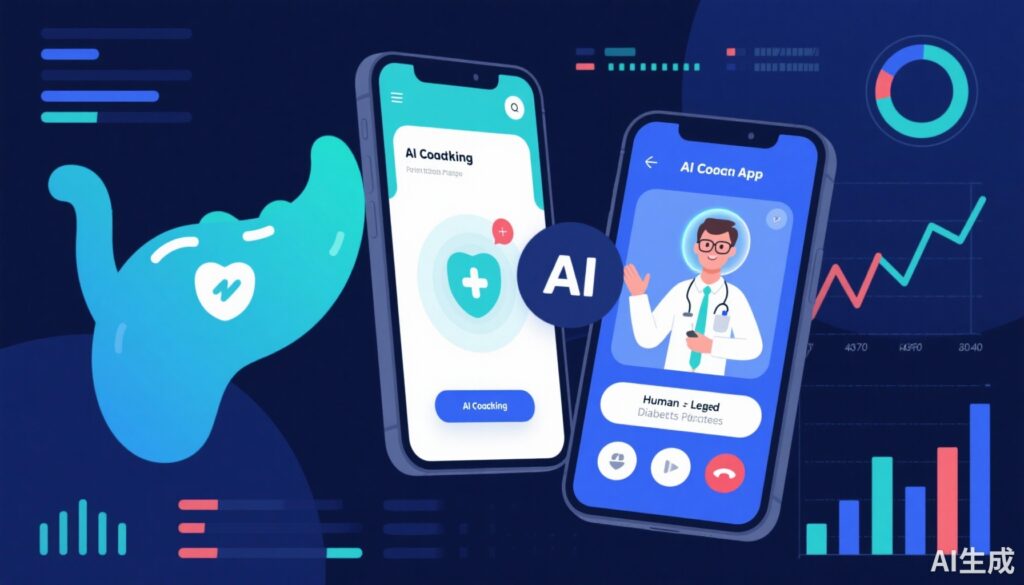Highlights
- The Diabetes Prevention Program (DPP) remains a cornerstone evidence-based lifestyle intervention to reduce progression from prediabetes to type 2 diabetes.
- Referral to an exclusively AI-led DPP lifestyle intervention achieved comparable outcomes in weight loss, HbA1c reduction, and physical activity as a human coach-led program in a large, pragmatic randomized clinical trial.
- High initiation rates and engagement were observed with the AI intervention, suggesting scalability and potential to reduce barriers inherent in human-delivered interventions.
- The trial supports expanding digital therapeutic strategies incorporating AI as a viable alternative to traditional human coaching in chronic disease prevention.
Background
Prediabetes affects a substantial proportion of adults globally and is a critical window for intervention to prevent progression to type 2 diabetes mellitus (T2DM), which is associated with significant morbidity, mortality, and healthcare costs. Lifestyle interventions emphasizing weight loss, increased physical activity, and glycemic control have demonstrated robust efficacy in delaying or preventing T2DM onset. The landmark Diabetes Prevention Program (DPP) trial established intensive human-led behavioral coaching as an effective strategy. However, widespread implementation faces challenges including workforce shortages, cost, and variability in coaching quality and accessibility.
Digital health interventions, including mobile apps supplemented by artificial intelligence (AI), offer a promising scalable alternative to traditional human coaching. AI can deliver personalized guidance, frequent feedback, and continuous monitoring remotely. Yet, high-quality evidence comparing AI-led versus human-led lifestyle interventions in diabetes prevention is limited, and assessing noninferiority in outcomes critical to diabetes risk such as weight loss, hemoglobin A1c (HbA1c), and physical activity is essential to inform clinical adoption.
Key Content
Study Design and Population Characteristics
The referenced trial by Mathioudakis et al. (2025) represents a rigorous phase 3, parallel-group, pragmatic, noninferiority randomized clinical trial conducted at two US sites. It enrolled adults aged 18 years or older with prediabetes and overweight or obesity, a population at elevated risk for diabetes progression. Participants (n=368) were randomized 1:1 to referral for either an AI-powered DPP lifestyle intervention or a human coach-led DPP delivered remotely over 12 months. Baseline characteristics featured a median age of 58 years, 71% female, with diverse racial representation (27% Black, 6% Hispanic, 61% White) and median BMI indicative of obesity (32.3 kg/m2).
Intervention Modalities
The AI-led intervention utilized a mobile application paired with a Bluetooth-enabled digital scale, providing automated personalized coaching, behavioral nudges, and continuous progress tracking without direct human interaction. The human-led intervention involved live coaching sessions conducted remotely by trained lifestyle coaches, replicating the DPP standard of care.
Primary and Secondary Outcomes
The primary composite outcome incorporated clinically meaningful measures:
- Maintenance of HbA1c below 6.5% throughout the study period.
- Achievement of at least 5% weight loss.
- Or at least 4% weight loss combined with 150+ minutes of physical activity weekly measured objectively by actigraphy.
- Or an absolute reduction in HbA1c by at least 0.2 percentage points at 12 months.
Noninferiority was established if the lower boundary of the 1-sided 95% confidence interval (CI) for the risk difference did not cross -15%. Secondary analyses examined components of the composite outcome and intervention adherence.
Results and Interpretation
AI-led DPP initiation surpassed human coaching (93.4% vs 82.7%), highlighting enhanced accessibility or acceptability of digital delivery. The primary outcome was achieved comparably in both groups—31.7% in AI versus 31.9% in human coaching—with a risk difference of -0.2% (1-sided 95% CI, -8.2%), thereby meeting the prespecified noninferiority margin.
Consistent findings were observed across the composite outcome’s individual domains (weight loss, HbA1c change, and physical activity). Sensitivity analyses reinforced the robustness of results.
These outcomes align with efficacy benchmarks established by prior DPP implementations but demonstrate that fully automated AI coaching can replicate human-led intervention effectiveness in a diverse, real-world population.
Contextualizing within Prior Evidence and Digital Health Research
Prior randomized controlled trials have validated human coaching’s efficacy for preventing diabetes, yet barriers remain for broad dissemination. Digital lifestyle programs leveraging web-based or mobile adjuncts have shown variable effectiveness, often limited by adherence or engagement. AI integration introduces enhanced individualized feedback loops and scalability.
The trial’s design as a pragmatic, noninferiority study contrasts with earlier efficacy-only trials, providing critical comparative effectiveness data relevant for health systems and policymakers considering resource allocation. This study complements smaller pilot studies demonstrating feasibility of digital and AI-driven lifestyle programs and supports their integration as standard preventive tools.
Expert Commentary
The demonstrated noninferiority of an AI-led program to human coaching is an important advance in diabetes prevention, indicating that technology can mitigate traditional barriers such as coach availability and participant scheduling. The higher initiation rate in the AI group suggests increased ease of access and user-driven engagement; however, nuances remain in participant preferences and longer-term sustainability.
Mechanistically, AI interventions mimic core behavioral change principles—self-monitoring, goal setting, feedback, and reinforcement—delivered with algorithmic personalization but lack the nuanced empathy and problem-solving capabilities of human coaches. Future iterations might integrate hybrid models leveraging AI for routine monitoring and human coaches for complex situations.
Limitations include the trial’s moderate sample size and focus on 12-month outcomes; durability beyond this period remains to be assessed. Potential disparities in digital literacy could constrain equitable access. Additionally, comprehensive cost-effectiveness analyses could further support health system adoption. Bias could arise from inherent differences in motivation among tech-savvy participants.
Current clinical guidelines endorse lifestyle modification as the first-line strategy for diabetes prevention but are less prescriptive regarding delivery modalities. This trial supports that AI-driven programs can be safely recommended as alternatives or complements to human coaching, expanding reach especially in underserved or resource-limited settings.
Conclusion
This landmark randomized clinical trial validates the noninferiority of a fully automated AI-powered Diabetes Prevention Program lifestyle intervention compared with standard human coaching in adults with prediabetes and overweight or obesity. The results underscore a paradigm shift toward scalable, technology-enabled behavioral interventions capable of reducing diabetes risk at the population level.
Future research should evaluate longer-term clinical outcomes, explore integration with hybrid models combining AI and human support, and assess cost-effectiveness and accessibility across diverse populations. As AI continues to mature, these findings pave the way for innovative, personalized, and scalable chronic disease prevention programs.
References
- Mathioudakis N, Lalani B, Abusamaan MS, Alderfer M, Alver D, Dobs A, et al. An AI-Powered Lifestyle Intervention vs Human Coaching in the Diabetes Prevention Program: A Randomized Clinical Trial. JAMA. 2025 Oct 27:e2519563. doi: 10.1001/jama.2025.19563. PMID: 41144242; PMCID: PMC12560030.
- Knowler WC, Barrett-Connor E, Fowler SE, et al. Reduction in the incidence of type 2 diabetes with lifestyle intervention or metformin. N Engl J Med. 2002;346(6):393-403. PMID: 11832527.
- Aroda VR, Edelstein SL, Goldberg RB, et al. The effect of lifestyle intervention and metformin on preventing or delaying diabetes among women with gestational diabetes: The Diabetes Prevention Program outcomes study 10-year follow-up. J Clin Endocrinol Metab. 2015;100(4):1646-53. PMID: 25645387.
- Hutchesson MJ, et al. Effectiveness of a smartphone-based weight management intervention with and without behavioral support: A randomized controlled trial. Obesity (Silver Spring). 2019;27(8):1378-1386. PMID: 31288481.
- Ludwig DS, et al. Behavioral strategies for diabetes prevention supported by mobile health technologies: A systematic review. Diabetes Care. 2021;44(6):1426-1437. PMID: 33946964.



